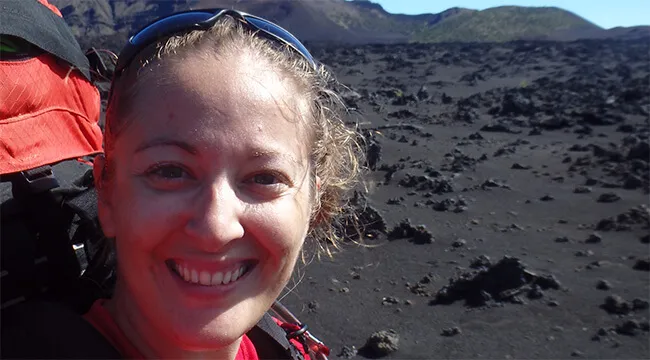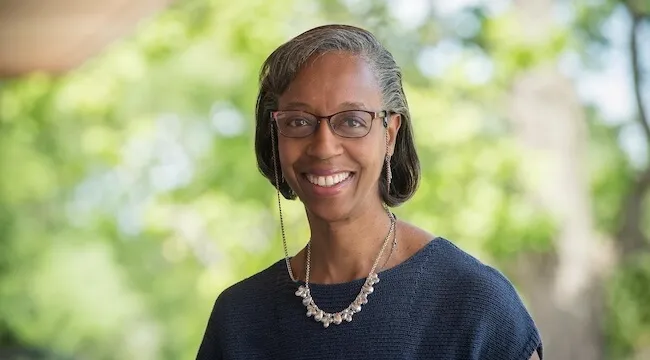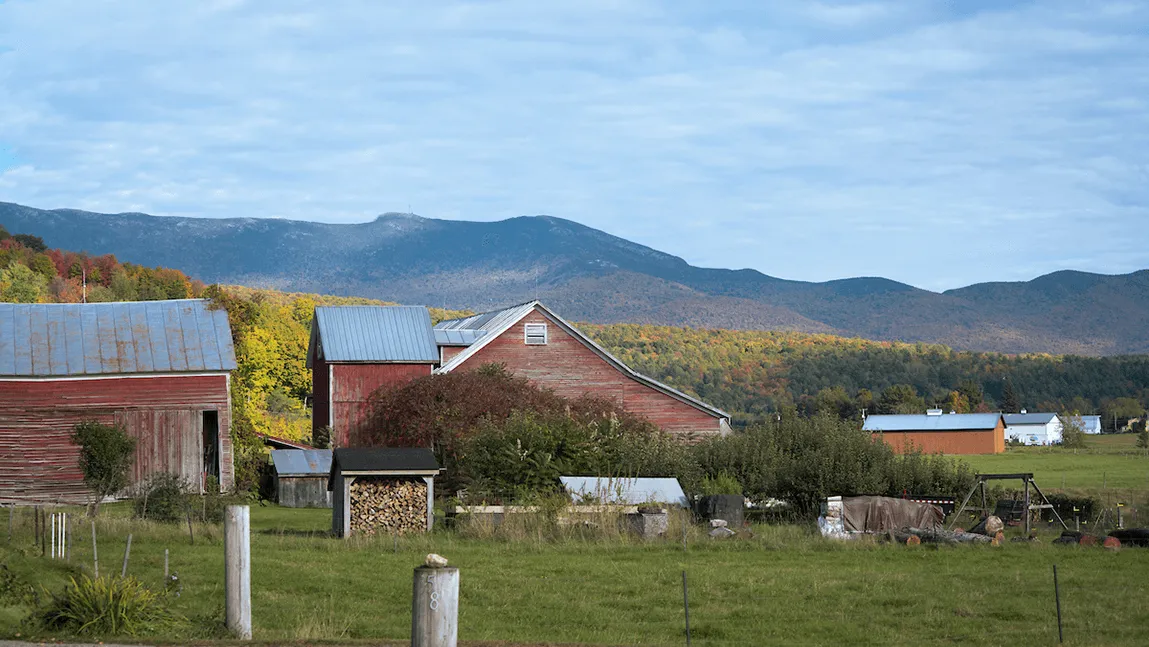As the number of extreme weather events increases, sea levels continue to rise, and food safety is at risk, climate-related research, education, and action have never been more crucial. To meet the need for more experts on the front lines of this issue, UVM is training the next generation of leaders in climatology.
Lesley-Ann Dupigny-Giroux, Ph.D., Distinguished Professor in the Department of Geography and Geosciences at UVM and Vermont State Climatologist, has been instrumental in training these future leaders. “Climatology is a three-dimensional field of study,” she says, “with so many yet-to-be answered questions that would serve the needs of us as humans and our understanding of the complex dynamics and processes that bring our atmosphere, vegetation, water resources, and land together.”
The five College of Arts and Sciences (CAS)-connected alumni featured here are working to answer some of those questions. They’re already making significant impacts in climate-related fields and providing the kind of leadership needed in a changing world.
Matt Hand
Matt Hand majored in geography and environmental studies at UVM. He graduated in 2023 and is now the State Hazard Mitigation Planner for Vermont Emergency Management (VEM).
“In my time with VEM,” he says, “I have worked to help update the 2023 State Hazard Mitigation Plan (SHMP), worked with municipalities to review Local Hazard Mitigation Plans for compliance with federal requirements, and developed applications for all the property buyouts throughout the state in response to the severe flooding in 2023 and 2024.” He also works in the State Emergency Operations Center, which serves as the logistical and information hub during disaster response.
“My time at UVM helped me get where I am because of the opportunities that were provided by being in such close contact with many brilliant professors,” Hand says. He took Climatology and Natural Hazards with Dupigny-Giroux his senior year and was fascinated by the subject. That class helped set him up for an internship with VEM, working on the vulnerability assessment and hazard profile portions of the 2023 SHMP.
Hand adds, “Vermont is a leader in climate work and there are many organizations that all are working toward a more resilient state. I’ve found all to be full of amazing, mission-driven, and compassionate people.”
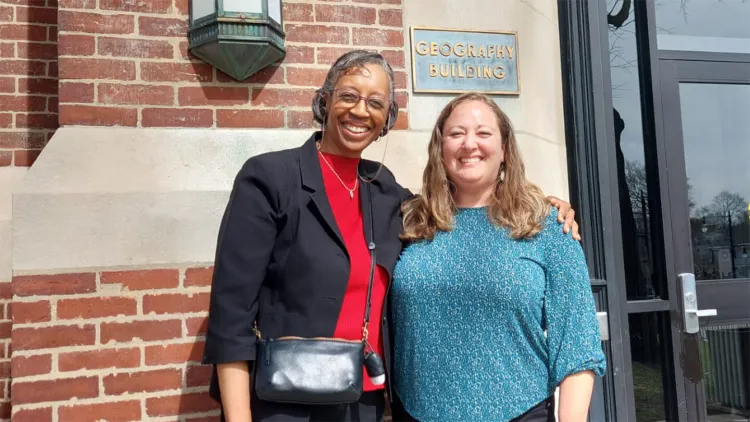
Abby Frazier
After living in Honolulu, Hawaii for 12 years, Abby Frazier (shown above with Dupigny-Giroux) now lives in Worcester, Massachusetts, where she is an Assistant Professor of Geography at Clark University. She graduated from UVM in 2008 with majors in geography and mathematics.
“I am a climatologist, so my research looks at better understanding how climate is changing and how it impacts water resources and ecosystems,” Frazier says. “I mainly work in Hawaii and the Pacific Islands studying rainfall variability and drought and working with local resource managers to build resilience.” Frazier was the chapter lead author of the Hawaii-Pacific Islands chapter of the Fifth U.S. National Climate Assessment. She also works with both undergraduate and graduate students, teaching courses like Earth System Science, Hydroclimatology, and Climate Dynamics.
Frazier says that the geography courses she took at UVM helped her realize her passion for exploring the world around her through a spatial lens. “I have been lucky enough to pursue this passion through graduate education with incredible lasting support from the UVM geography faculty,” she says. “They continued to open doors for me after I graduated and helped give me the push I needed to end up on this path. I will forever be grateful for that.”
Caitlin Crossett
Caitlin Crossett, whose academic background and dissertation topics were both centered on climatology, received a Ph.D. in civil and environmental engineering from UVM in 2022. With Dupigny-Giroux as one of her two Ph.D. advisors, Crossett had the opportunity to gain hands-on teaching experience in the Department of Geography and Geosciences and training in how to teach in higher education as a part of the Graduate Teaching Program.
Now an Assistant Professor of Atmospheric Sciences at the University of North Carolina–Asheville, Crossett primarily teaches climatology, oceanography, climate change, and weather-forecasting classes to undergraduate and master’s-level students.
“Additionally, I mentor students in research projects,” Crossett says. “Currently, a student and I are analyzing the causes of the extensive timber damage associated with Hurricane Helene in western North Carolina and upstate South Carolina.”
Crossett says that, while at UVM, interacting with engineers in classes and in weekly department seminars allowed her to practice communicating her research to folks who did not have the same background knowledge she did. “These experiences were invaluable in securing my current position,” she says, “which requires that I am able to talk to and collaborate with folks across disciplines.”
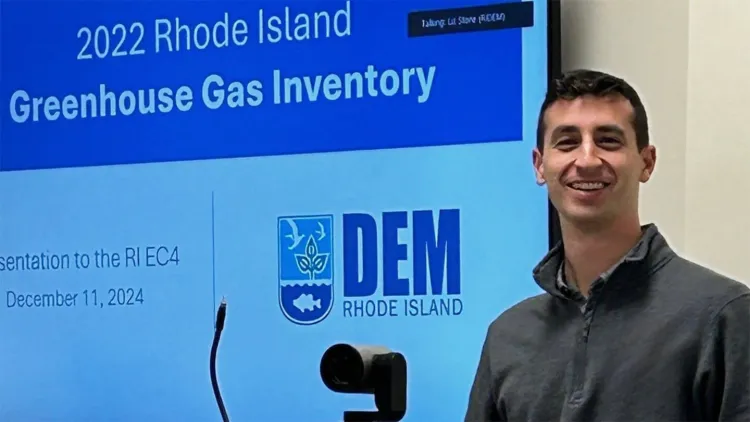
Joseph Poccia
Joe Poccia (shown above) currently works for the Rhode Island Department of Environmental Management, where he serves as the State Climatologist. His job entails compiling the annual Rhode Island Greenhouse Gas Inventory, overseeing all operations of the Rhode Island State Climate Office (especially advising the state on the presence of drought), and assisting in the development of state climate-change mitigation plans. Poccia also periodically leads scientific studies to improve the integrity of Rhode Island’s greenhouse gas emissions data. He enjoys creating clear, concise, and complete recommendations for policymakers that enable them to respond to the impacts of climate change in alignment with the state’s 2021 Act on Climate.
Poccia majored in geography when he attended UVM during the 2017-2018 academic year and 2018 fall semester. He then transferred to Purdue University because they offered a B.S. in atmospheric science, a degree required to meet the job specifications to work for the National Weather Service. He graduated from Purdue in 2021.
“One of the best pieces of advice I received at UVM,” Poccia says, “was on the back of my acceptance package: ‘College is about discovering who you are.’” This stayed with him, as he started out as a biology major in 2017 but soon changed course. Over the next few semesters, he took different classes and engaged with professional meteorologists to discover what he wanted from his college education.
Poccia encourages students to pursue careers in climatology with the same curiosity so that they, too, can make real-world impacts. “In state government, I see the impact of my work through policy decisions,” he says. “It’s paramount for me to communicate scientific findings in the best way possible. Often, good public policy hinges on whether decision makers understand the science. This is more important now than ever before.”
Zachary Borst
Currently the Regional Coordinator for Vermont Emergency Management, Zack Borst graduated from UVM in 2010 with a major in geography. He now helps communities prepare for, respond to, and recover from disasters. That includes training emergency-management volunteers, conducting exercises to evaluate plans and procedures, and helping towns plan for emergencies.
“There isn’t a typical week, which keeps the work very interesting,” Borst says. “I work a lot with volunteers, which I really enjoy, because I spent many years volunteering in emergency management and as a firefighter/EMT. Vermont has faced many challenging weather events in recent years, and we work hard to ensure our communities are better prepared and more resilient.”
Borst says that his professors really pushed him to take what he was learning and apply it outside the classroom. “Dr. Dupigny-Giroux was invested in our success,” he says. In fact, she introduced Borst to the field of emergency management, setting up an internship that would lead to him being hired as UVM’s Emergency Manager. She also helped him get an internship at the National Weather Service in the Burlington office—rare for someone not majoring in meteorology.
“The more we understand about our climate, the more we can shift away from simply reacting to weather events and instead become more proactive and prepared,” Borst says. “A career in climatology can directly help communities and the world adapt and build a safer, more resilient future.”
For students thinking about pursuing a similar path as these five alumni—or blazing their own trail—Dupigny-Giroux adds that it is an exciting time to be a climatologist. “It’s also exciting to be able to mentor the next generations of climatologists,” she says. “The breadth of the careers pursued by my former students is a testament to the appeal of training in the geography-climatology tradition, and a source of inspiration for those seeking to follow in their footsteps.”
